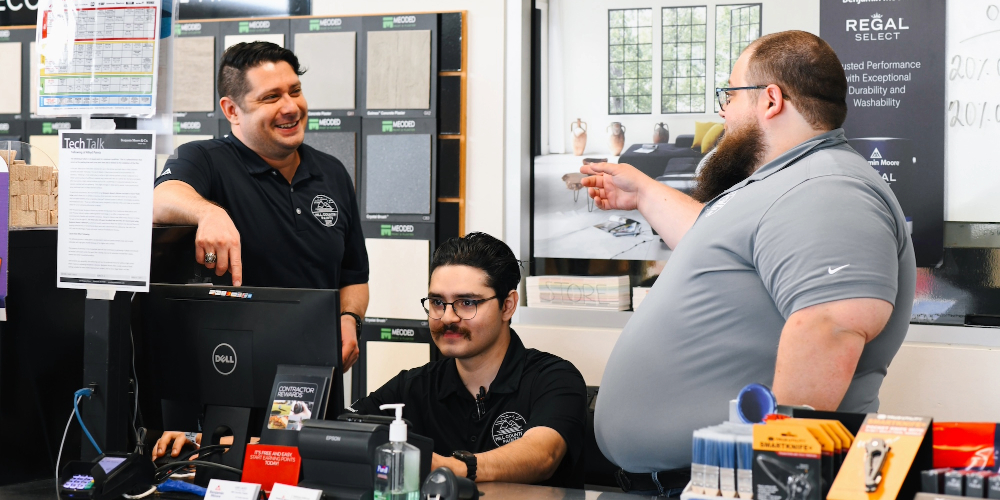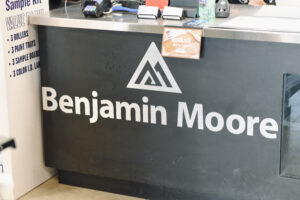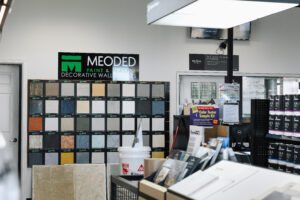
Hill Country Paints Creates Culture of Selling, Embraces Innovation
James Anderson established Hill Country Paints in 2017 in Bryan, Texas, as a Kelly-Moore Paints dealer store. In 2020, Hill Country Paints re-located to College Station and added Benjamin Moore. The operation currently has locations in Waco, College Station and three in Houston. The company is dedicated to serving its local communities, with interior and exterior paints, high-end or commercial-grade coatings, sundries and more.
Key Takeaways
- Developed a culture of selling.
- Embraces innovation where it makes sense for the operation.
- Strives to provide high-quality products and a high level of customer service.
The responsibility is on us as small business retailers to not go into the future kicking and screaming, but rather be reasonable and evolve with what’s coming.
- Steven Hill
Employee Development Manager
Creating a Culture of Selling
Employee development manager Steven Hill faces the challenge of growing sales and attracting new customer segments amid heavy competition.
A culture of selling will play a large role in moving the business forward, he says, as it will foster engagement, positive attitudes and a sense of shared responsibility. Engaged employees will build loyal customers, which build sales through repeat business and differentiates Hill Country Paints from neighboring big boxes.
“Engaged and satisfied employees are more likely to perform well,” Hill says. “I measure engagement through employee surveys and track employee development through indicators such as training performance and certifications they’ve achieved.”
The survey includes questions such as, “What are your short-term and long-term goals as an employee of a retail paint store? List at least one goal for each category and explain how you plan to achieve them,” and “What are the resources or support that you need to improve or develop in your job? List at least three resources or support that you think would help you achieve your goals and explain how they would benefit you.”
Knowing an employee’s goals and training needs helps build their engagement, which in turn builds a positive culture.
“Any training we do must address culture. Culture has to be second nature to everyone in the company,” Hill says. “Our staff needs to have a positive attitude and sense of belonging with the company as a whole and with their co-workers.”
Embracing Innovation
Hill is so interested in the ways AI can benefit his operation that he is currently enrolled in an online boot camp for machine learning and artificial intelligence through Ohio State University.
The classes are designed to give students real-world and hands-on experience with the latest AI technologies and methodologies. Because he doesn’t come from a data or computer science background, Hill hopes to use what he learns to implement AI-driven solutions to better optimize inventory management and improve customer service.
“A chatbot will allow us to provide instant support and product recommendations to customers, and by doing so, we can free up our employees to handle more complex tasks,” Hill says. “I would like to implement chatbots to guide customers through a more streamlined and easier process, so my employees can focus on taking care of customers in the store.”
While the classes are not specifically tailored to independent paint retailers, Hill is learning the framework for how different AI technologies, specifically supervised learning and unsupervised learning, could work in retail and his paint operation.
Supervised learning programs with labeled input and output information could be used for more accurate and reliable predictions in areas like sales forecasting, inventory management and customer behavior, Hill says. Supervised learning could also help identify outliers, such as abnormal sales spikes from weather, special store promotions or other reasons, so those situations can be potentially recreated to boost sales again.
“Another big strength with supervised learning is that it has more reliable predictions when it pertains to marketing, allowing for more targeted marketing that can be used to identify and target specific customer segments based on their past purchase behavior and demographic data,” Hill says.
Hill foresees using unsupervised learning, which requires him to do more interpretation of the output data, for market analysis. For example, looking at items frequently purchased together to give insights on better ways to lay out the store.
While taking the classes, Hill has already started playing around with different AI programs, inputting existing data and using models to predict and forecast.
“I’m using a very small set of data, so right now it’s all about getting repetitions in and just practicing and getting the muscle memory down,” Hill says. “To make really good use of this for our business, we need a lot of information, and not just more information, but good quality information. If you give it bad information, you’re going to get bad information back.”
While not glamorous, one of the keys to effectively using AI is having clean data, which Hill says means getting into the nitty gritty of your operation’s spreadsheets.
“It is a lot, and it helps to have someone on staff who is willing to get into the weeds,” he says.
Hill emphasizes that he is by no means an expert in AI, but is excited to learn all he can because he sees the future potential benefits of the technology. Some people have fears of AI taking over jobs, but right now, AI is taking care of those tasks that free up associates to focus on the customer.
“The responsibility is on us as small business retailers to not go into the future kicking and screaming, but rather be reasonable and evolve with what’s coming,” Hill says. “The big boxes are already investing in these technologies, and if we don’t start adapting and implementing, we will never be on the same playing field. We need to take our strengths of better products and higher levels of customer service and leverage those with technology.”










